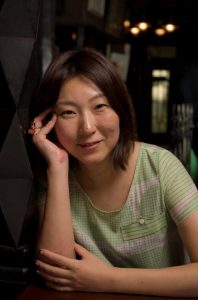The Easy Life in Kamusari EXCERPT
From Shion Miura, the award-winning author of The Great Passage, comes a rapturous novel where the contemporary and the traditional meet amid the splendor of Japan’s mountain way of life.
We are delighted to feature this excerpt!
 Yuki Hirano, is just out of high school when his parents enroll him, against his will, in a forestry training program in the remote mountain village of Kamusari. No phone, no internet, no shopping. Just a small, inviting community where the most common expression is “take it easy.”
Yuki Hirano, is just out of high school when his parents enroll him, against his will, in a forestry training program in the remote mountain village of Kamusari. No phone, no internet, no shopping. Just a small, inviting community where the most common expression is “take it easy.”
At first, Yuki is exhausted, fumbles with the tools, asks silly questions, and feels like an outcast. Kamusari is the last place a city boy from Yokohama wants to spend a year of his life. But as resistant as he might be, the scent of the cedars and the staggering beauty of the region have a pull.
Yuki learns to fell trees and plant saplings. He begins to embrace local festivals, he’s mesmerized by legends of the mountain, and he might be falling in love. In learning to respect the forest on Mt. Kamusari for its majestic qualities and its inexplicable secrets, Yuki starts to appreciate Kamusari’s harmony with nature and its ancient traditions.
EXCERPT
Book 1 in the Forest Series
Shion Miura
Translated by Juliet Winters Carpenter
Kamusari villagers are really easygoing, especially those living deep in the mountains. They often use the expression naa-naa, which might sound negative but means something like “take it easy,” “relax.” It can even be a greeting. Two villagers passing on the road might have the following exchange:
“Naa-naa.” (Lovely day.)
“Mm-hm.”
“Your man on the mountain?” (Has your husband left already to work in the forest?)
“Says today he’ll be a holler away so he’ll naa-naa after lunch. A body can’t even vacuum with him around, so I’m in a fix.” (He says he’s working on a nearby mountain today, so he’ll take his time and go over after lunch. I can’t get my cleaning done with him in the way, so I’m upset.)
In the beginning, I often had trouble making out what they were saying. Kamusari is in Mie, near the prefectural border with Nara, and the local dialect is similar to the drawl of western Japan. Villagers often tag their sentences with a soft “na,” which adds on another layer of calm.
“Got over your stomachache, na.”
“Yeah.”
“Heard you ate too much, na.”
“Probably, na.”
Laid back as they are, they do get worked up on occasion. I once heard Nao scold a little kid: “I said no first grader plays in the river unless he’s with a grown-up! Do it again and I’ll give you what for! A kappa’ll come and steal your shirikodama!” (Kappa, river imps, are supposed to have designs on human shirikodama, the soul-ball located inside the anus.) As for who Nao is, I’ll get to that later.
Anyway, threatening a kid with kappa in this day and age? Really? And what’s the deal with shirikodama? There’s no such thing in my butt, that’s for sure. But the kid wailed, “No kappa, they’re scary! I won’t do it anymore, promise! I’m sorry!” He was on the verge of tears. Talk about innocent. It’s as if all the villagers stepped out of a folktale.
Soon it’ll be a year since I left my hometown of Yokohama and came here to live. I decided to write down everything that’s happened in the last twelve months. Life here strikes me as pretty unusual. The people are funny in a way. They seem so mild-mannered, but then they’ll quietly say or do something totally destructive.
I wonder if I can make a go of it here. I don’t know yet, but anyway I decided to try writing down everything. The dusty computer in Yoki’s place turned on when I plugged it in, so that helps, but it’s not hooked up to the internet. He uses a black dial phone—first one I ever saw—and none of the rooms in his house has a cable outlet. I wonder why he bought a computer in the first place? Maybe he was just curious. I bet after he bought it, reading the instruction manual was too much trouble so he just let it sit there.
As for who Yoki is, I’ll get to that.
I’ve never written anything very long, but making a written record will probably help me relax, Kamusari-style, and sort out my feelings. There’s not as much work to do in the winter, so I’ll have plenty of time to write.
I figure there are a couple of reasons why Kamusari villagers are so easygoing. One is that most of them are involved in forestry, where you have to think in cycles of a century; the other is that there’s no place to hang out at night, so when it gets dark everybody just hits the hay. “Running around won’t make the trees grow faster. Get plenty of rest, eat hearty, and tomorrow take what comes”: that seems to be the prevailing philosophy.
Lately, without really meaning to, I’ve started ending my sentences with “na,” too. But I’m still not up on the local speech enough to reproduce it on paper. Just imagine if you will that everybody’s speaking Kamusari dialect all the time. Not that I have the slightest intention of ever showing this to anyone. But it’s kind of cool, isn’t it? To pretend I have readers and be like, “Bear in mind as you read, everybody’s speaking Kamusari dialect”?
Or not.
Anyhow, I’ll just go ahead and write down what happened this year, as it comes to mind. Sit back and relax. Whoever you are—heh heh.
BUY THE EASY LIFE IN KAMUSARI HERE
—
 ABOUT THE AUTHOR: Shion Miura made her fiction debut in 2000 with Kakuto suru mono ni maru (A Passing Grade for Those Who Fight). In 2006, she won the Naoki Prize for her story collection Mahoro ekimae Tada Benriken (The Handymen in Mahoro Town). Her other novels include Kaze ga tsuyoku fuiteiru (The Wind Blows Hard), Kogure-so monogatari (The Kogure Apartments), and Ano ie ni kurasu yonin no onna (The Four Women Living in That House). Fune o amu (The Great Passage, translated by Juliet Winters Carpenter) received the Booksellers’ Award in Japan in 2012 and an Earphones Award and was made into an award-winning motion picture. Miura has also published more than fifteen collections of essays and is a manga aficionado.
ABOUT THE AUTHOR: Shion Miura made her fiction debut in 2000 with Kakuto suru mono ni maru (A Passing Grade for Those Who Fight). In 2006, she won the Naoki Prize for her story collection Mahoro ekimae Tada Benriken (The Handymen in Mahoro Town). Her other novels include Kaze ga tsuyoku fuiteiru (The Wind Blows Hard), Kogure-so monogatari (The Kogure Apartments), and Ano ie ni kurasu yonin no onna (The Four Women Living in That House). Fune o amu (The Great Passage, translated by Juliet Winters Carpenter) received the Booksellers’ Award in Japan in 2012 and an Earphones Award and was made into an award-winning motion picture. Miura has also published more than fifteen collections of essays and is a manga aficionado.
 ABOUT THE TRANSLATOR: Juliet Winters Carpenter is a professor emerita of Doshisha Women’s College of Liberal Arts and a veteran
ABOUT THE TRANSLATOR: Juliet Winters Carpenter is a professor emerita of Doshisha Women’s College of Liberal Arts and a veteran
translator. Her first translated novel, Secret Rendezvous by Kobo Abe, received the 1980 Japan-U.S. Friendship Commission Prize for the
Translation of Japanese Literature. In 2014, her translation of A True Novel by Minae Mizumura received the same award, as well as the
American Translators Association’s Lewis Galantière Award. Besides Shion Miura’s bestselling novel The Great Passage, her recent translations
include An I-Novel by Minae Mizumura, At the End of the Matinee by Keiichiro Hirano, and Pax Tokugawana: The Cultural Flowering of Japan,
1603–1853 by Tōru Haga. She and her husband live on Whidbey Island in Washington State.
Category: On Writing

























